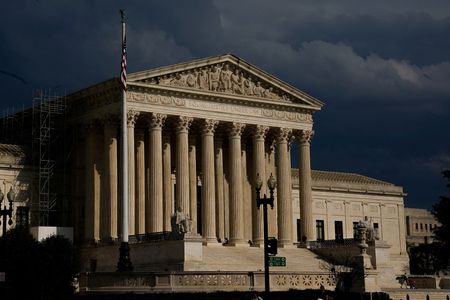 1
1 1
1
(Reuters) – The U.S. Supreme Court has issued several important rulings during its current term that began last October and is due to decide its remaining cases by the end of June including disputes involving race-conscious college admissions practices, President Joe Biden’s student debt forgiveness plan and voting rights.
Here is a look at some of the rulings issued by the court this term.
ENVIRONMENTAL REGULATION
The court on Thursday further limited the regulatory reach of the U.S. Environmental Protection Agency, embracing a stringent new test for declaring wetlands protected under a landmark federal anti-pollution law in a ruling favoring an Idaho couple who challenged the EPA.
PROTECTIONS FOR INTERNET COMPANIES
The court on May 18 left legal protections for internet and social media companies unscathed and refused to clear a path for victims of attacks by militant groups to sue these businesses under an anti-terrorism law. In both cases, families of people killed by Islamist gunmen overseas had sued to try to hold internet companies liable because of the presence of militant groups on their platforms or for recommending their content.
FEDERAL AGENCY POWER
The court on April 14 made it easier to challenge the regulatory power of federal agencies in rulings backing Axon Enterprise Inc’s bid to sue the Federal Trade Commission and a Texas accountant’s gripe with the Securities and Exchange Commission.
CORRUPTION PROSECUTIONS
The court on May 11 further restricted the ability of federal prosecutors to pursue corruption cases, overturning the bribery conviction of Joseph Percoco, an ex-aide to Democratic former New York Governor Andrew Cuomo, and former construction company executive Louis Ciminelli.
ANDY WARHOL ARTWORK
Andy Warhol’s estate lost its copyright fight with celebrity photographer Lynn Goldsmith when the court on May 18 faulted the famed pop artist’s use of her photo of Prince in a silkscreen series depicting the charismatic rock star.
INTERSTATE COMMERCE
The court preserved a California law banning the sale of pork in America’s most-populous state from pigs kept in tightly confined spaces in a May 11 ruling that rejected an industry challenge.
PROPERTY TAXES
The court on May 25 curbed state and local governments from seizing and selling the homes of people with unpaid property taxes and keeping the proceeds beyond the amount owed, deeming the practice unconstitutional in a ruling in favor of a 94-year-old woman who battled tax authorities in Minnesota.
(Reporting by Andrew Chung and John Kruzel; Editing by Will Dunham)